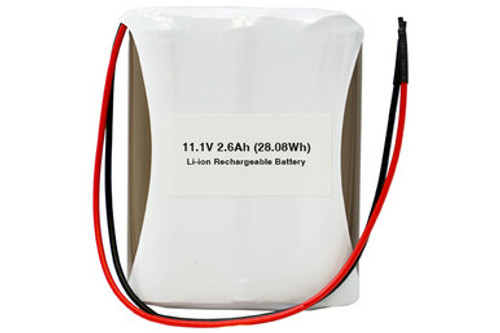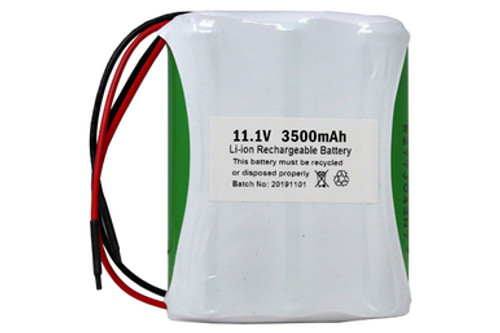
-

11.1 Volt Lithium Ion Battery Pack (2600 mAh) with Protection IC
$55.99As low as:- Buy in bulk and save
Bulk discount rates
Below are the available bulk discount rates for each individual item when you purchase a certain amount
- Buy 2 - 3 and pay only $55.99 each
- Buy 4 - 8 and pay only $53.19 each
- Buy 9 - 17 and pay only $52.09 each
- Buy 18 or above and pay only $52.09 each
-

11.1 Volt Lithium Ion Battery Pack (3500 mAh) with Protection IC
$86.29As low as:- Buy in bulk and save
Bulk discount rates
Below are the available bulk discount rates for each individual item when you purchase a certain amount
- Buy 2 - 3 and pay only $86.29 each
- Buy 4 - 5 and pay only $81.99 each
- Buy 6 - 11 and pay only $80.19 each
- Buy 12 or above and pay only $80.19 each
-

11.1 Volt Lithium Ion Battery Pack (5200 mAh) with Protection IC
$89.59As low as:- Buy in bulk and save
Bulk discount rates
Below are the available bulk discount rates for each individual item when you purchase a certain amount
- Buy 2 - 3 and pay only $89.59 each
- Buy 4 - 5 and pay only $85.09 each
- Buy 6 - 11 and pay only $83.29 each
- Buy 12 or above and pay only $83.29 each
-

11.1 Volt Lithium Ion Battery Pack (6600 mAh) with Protection IC
$111.99As low as:- Buy in bulk and save
Bulk discount rates
Below are the available bulk discount rates for each individual item when you purchase a certain amount
- Buy 2 - 3 and pay only $111.99 each
- Buy 4 - 5 and pay only $106.39 each
- Buy 6 - 8 and pay only $104.09 each
- Buy 9 or above and pay only $104.09 each
11.1 Volt Lithium-Ion Battery Packs: Power and Efficiency Redefined
11.1 Volt Lithium-Ion battery packs, constructed with 18650 Lithium-Ion cells, are a versatile and efficient power source for a wide range of electronic devices. Renowned for their high energy density, long cycle life, and quick charging capabilities, these battery packs have become a popular choice for applications where portability, reliability, and performance are critical.
What Are 11.1 Volt Lithium-Ion Battery Packs?
Lithium-Ion battery packs are composed of individual cells connected in series or parallel to achieve the desired voltage and capacity. In the case of 11.1 Volt battery packs, three 18650 Lithium-Ion cells are connected in series, with each cell offering a nominal voltage of 3.7 volts, adding up to a total voltage of 11.1 volts.
What Are 18650 Cells?
18650 cells are cylindrical Lithium-Ion batteries, measuring approximately 18 mm in diameter and 65 mm in length. They are widely used due to their:
High energy density: Capable of storing significant energy in a compact form.
Durability: Withstanding numerous charge-discharge cycles without substantial degradation.
Versatility: Commonly found in devices such as laptops, power tools, and electric vehicles.
Key Advantages of 11.1 Volt Lithium-Ion Battery Packs
1. High Energy Density
One of the most significant advantages of Lithium-Ion batteries is their high energy density, allowing them to:
Store more energy in a smaller and lighter package compared to other rechargeable batteries.
Deliver extended runtimes for portable devices like drones, RC cars, and power banks.
2. Long Cycle Life
Lithium-Ion battery packs offer an extended cycle life, enabling them to withstand hundreds of charge-discharge cycles before noticeable capacity loss. This makes them ideal for devices that require frequent recharging, providing long-term reliability.
3. Quick Charging Capability
11.1 Volt battery packs can be charged at high rates, reducing downtime for frequently used devices. This feature is especially valuable for applications like drones and professional equipment, where rapid recharging can significantly enhance productivity.
4. Lightweight and Portable
The compact and lightweight nature of Lithium-Ion battery packs makes them a preferred choice for portable devices. Whether used in handheld electronics or aerial drones, these batteries provide powerful energy solutions without adding unnecessary bulk.
5. Low Self-Discharge Rate
Lithium-Ion batteries have a low self-discharge rate, meaning they retain their charge for extended periods when not in use. This feature ensures that devices powered by these batteries are always ready to perform, even after prolonged storage.
Common Applications of 11.1 Volt Lithium-Ion Battery Packs
1. Drones
Drones demand lightweight, high-capacity battery packs to power their rotors and onboard electronics. 11.1 Volt Lithium-Ion packs are ideal for:
Providing extended flight times.
Supporting high-performance features like cameras and GPS systems.
2. RC Cars and Boats
Remote-controlled vehicles benefit from the high discharge rates of Lithium-Ion batteries, which deliver the bursts of power needed for quick acceleration and sustained performance.
3. Portable Power Banks
These battery packs are commonly used in portable chargers, offering reliable energy storage for recharging devices like smartphones, tablets, and laptops on the go.
4. Medical Devices
Portable medical equipment, such as monitors, infusion pumps, and diagnostic tools, rely on the consistent and efficient power provided by 11.1 Volt Lithium-Ion battery packs.
5. Power Tools
Cordless tools, including drills and saws, benefit from the lightweight and long-lasting energy provided by these battery packs, enhancing portability and ease of use.
Limitations of 11.1 Volt Lithium-Ion Battery Packs
Despite their many advantages, Lithium-Ion batteries have some limitations:
1. Sensitivity to High Temperatures
Exposure to high temperatures can degrade the performance and lifespan of Lithium-Ion batteries. It’s important to:
Avoid leaving batteries in direct sunlight or near heat sources.
Ensure proper ventilation in devices to dissipate heat during use.
2. Need for Specialized Charging
Lithium-Ion battery packs require dedicated chargers with built-in protection features to:
Prevent overcharging and overheating.
Ensure balanced charging of all cells in the pack.
3. Cost
Compared to other rechargeable chemistries, Lithium-Ion battery packs can have a higher upfront cost. However, their long cycle life and superior performance often justify the investment over time.
4. Potential Safety Risks
Improper handling, charging, or storage can pose safety risks, including the potential for thermal runaway. Most modern Lithium-Ion battery packs include protection circuits to mitigate these risks.
Best Practices for Maintaining 11.1 Volt Lithium-Ion Battery Packs
To maximize the performance and longevity of your battery pack, follow these best practices:
1. Use the Right Charger
Always use a charger designed for Lithium-Ion batteries to prevent overcharging or undercharging.
2. Avoid Extreme Temperatures
Store batteries in a cool, dry place when not in use.
Operate devices within the manufacturer’s recommended temperature range.
3. Charge Appropriately
Avoid fully depleting the battery pack. Recharging when the battery reaches 20–30% capacity can extend its lifespan.
Disconnect the charger once the battery is fully charged to prevent overcharging.
4. Monitor for Damage
Regularly inspect the battery pack for signs of swelling, leakage, or physical damage, and replace it if necessary.
5. Recycle Responsibly
Lithium-Ion batteries contain valuable materials and should be recycled at designated facilities to minimize environmental impact.
How to Choose the Right 11.1 Volt Lithium-Ion Battery Pack
When selecting a battery pack, consider these factors:
1. Capacity (mAh)
Choose a pack with sufficient capacity to meet your device’s runtime requirements.
2. Discharge Rate
Ensure the battery pack can handle the current demands of your device, particularly for high-drain applications like drones or RC vehicles.
3. Brand and Quality
Opt for reputable brands like Panasonic, LG, or Samsung, known for their high-quality 18650 cells.
11.1 Volt Lithium-Ion battery packs, constructed with 18650 cells, offer a powerful and efficient energy solution for a variety of applications. Their high energy density, long cycle life, and quick charging capabilities make them ideal for demanding devices like drones, RC cars, and medical equipment.
While these battery packs require proper care and specialized charging to maximize their performance, their benefits far outweigh their limitations. By investing in a high-quality 11.1 Volt Lithium-Ion battery pack and following best practices for use and maintenance, you can enjoy reliable, long-lasting power for years to come.





